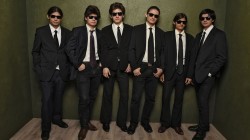Cinema | July 9th, 2015
 Fascinating and frustrating, Crystal Moselle’s documentary “The Wolfpack” is essential viewing for fans of DIY moviemaking and cinephilia. The premise of Moselle’s film and the promise of her incredible subjects – a sextet of isolated, homeschooled brothers who grew up carefully acting out movies like “Reservoir Dogs” and “The Dark Knight” – makes “The Wolfpack” sound a little more otherworldly and exotic than the evidence supplied. Even so, the endearing personalities of the Angulo boys, who lived with sister Visnu, mother Susanne and father Oscar in public housing on the Lower East Side of Manhattan, is a trippy mashup of “Grey Gardens” and “Be Kind Rewind” that captured the Grand Jury Prize for documentary at Sundance.
Fascinating and frustrating, Crystal Moselle’s documentary “The Wolfpack” is essential viewing for fans of DIY moviemaking and cinephilia. The premise of Moselle’s film and the promise of her incredible subjects – a sextet of isolated, homeschooled brothers who grew up carefully acting out movies like “Reservoir Dogs” and “The Dark Knight” – makes “The Wolfpack” sound a little more otherworldly and exotic than the evidence supplied. Even so, the endearing personalities of the Angulo boys, who lived with sister Visnu, mother Susanne and father Oscar in public housing on the Lower East Side of Manhattan, is a trippy mashup of “Grey Gardens” and “Be Kind Rewind” that captured the Grand Jury Prize for documentary at Sundance.
The most magnetic scenes in “The Wolfpack” revolve around the obsessively crafted movie performances staged by the Angulos. Props and costumes fabricated from cardboard and packing tape are fetishistic talismans: the automatic pistols include separate, fitted magazines, and a Batman costume fashioned from yoga mats and cereal boxes is a thing of beauty. Different reports have suggested that the Angulos rarely videotaped their efforts, and Clayton Dillard takes Moselle to task for not elucidating this point more clearly, or, for that matter, exploring why the brothers didn’t preserve these elaborate productions “to be shared with those beyond the confines of their apartment-cum-prison cell.”
The audience is asked to accept the assertion that patriarch Oscar, an ex-Hare Krishna who named his sons Mukunda, Narayana, Govinda, Bhagavan, Krsna and Jagadisa, has prohibited the boys from venturing outside of their four-bedroom dwelling. The edict is more implicit than explicit, as the brothers have already begun to explore the larger world, and certainly would not have met Moselle had they been totally confined to their building. Emergent press for the movie has aggressively capitalized on the “locked away from society” angle, exaggerating the idea that movies were the siblings’ exclusive window on outside society.
For many viewers, “The Wolfpack” leaves too many avenues unexplored and too many questions left unanswered. Kate Erbland distills one of the most vexing issues, writing that Moselle has made “a film about access, and though we are admitted into the world of the eponymous Wolfpack, not understanding how we got there robs the film of compelling commentary.” For whatever reason, the director does not include any information regarding her unique relationship with the Angulos beyond the quick acknowledgment that she is possibly the very first outsider invited to visit the apartment. We must guess at timelines and other details, especially the dark intimations of Oscar’s possible alcoholism and abuse.
What Moselle gets really right in “The Wolfpack” is the expression of movie mania that fuels a dream-space recognizable to anyone under the spell of filmmaking. One sequence, in which the song “This Is Halloween” from “The Nightmare Before Christmas” plays out like a scarier version of any of the horror classics on which the Angulos have patterned their outfits, defies any viewer to remain calm when candles threaten to set the room ablaze. In another, the kids watch “Blue Velvet” together, enraptured by David Lynch’s masterpiece. By the end of the movie, Mukunda is seen crafting an original movie production featuring a stunning owl costume and a Lady in the Radiator-esque love interest. The spirit of his creation owes as much to George and Mike Kuchar as it does to the “Eraserhead” auteur, and I for one can’t wait to see it.
February 9th 2026
February 4th 2026
January 26th 2026
January 19th 2026
January 12th 2026

__293px-wide.png)
_(1)_(1)_(1)_(1)_(1)__293px-wide.jpg)
__293px-wide.jpg)

_(1)_(1)_(1)_(1)_(1)__293px-wide.jpg)